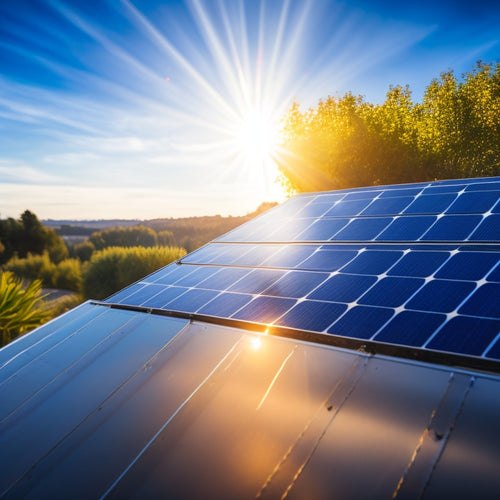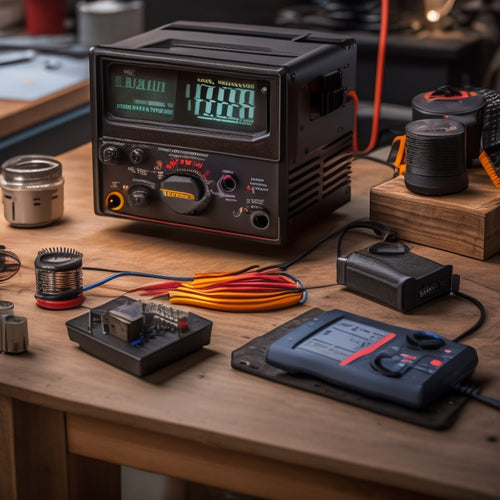
Solar Panel Storage Battery Cost
Share
You'll typically spend between $8,000 and $15,000 on a high-quality solar panel storage battery, like Tesla Powerwall, which can optimize your energy consumption and guarantee a reliable energy supply after dark. This investment promotes sustainable living, allowing for energy independence and reduced reliance on grid electricity. The cost is influenced by factors such as energy needs, budget, and grid independence. With considerations like Ah capacity ratings, cycle count, and maintenance, you'll want to investigate the various types of deep cycle batteries available. As you assess the cost, you'll realize how these factors impact the overall value of your solar panel storage system.
The Essentials
- Solar panel storage battery cost varies based on energy storage capacity, with higher Ah ratings generally increasing costs.
- High-quality solar batteries like Tesla Powerwall offer optimal energy consumption and reliable energy supply, but come at a higher cost.
- Installation of solar panel storage systems can significantly lower electricity bills by storing excess daytime energy and reducing grid reliance.
- Government incentives can accelerate the return on investment for solar panel storage batteries, making them a more financially viable option.
- Managing energy usage and selecting the right battery type can minimize costs, with lithium-ion batteries offering long-lasting energy storage without degradation.
Energy Independence at Night
You're probably wondering how you can maintain energy independence at night when the sun isn't shining.
With a high-quality house solar battery like the Tesla Powerwall, you can optimize your energy consumption to reduce reliance on the grid Renewable Energy.
A solar panel storage battery's nighttime power backup capability guarantees you have a reliable source of energy during evening hours.
The energy storage capacity of your battery will determine how long you can power your home or business after dark.
Nighttime Power Backup
One essential aspect of energy independence is having a reliable nighttime power backup system in place, which allows homeowners to continue drawing power from their solar panels even after the sun sets. This means you can still enjoy the benefits of solar energy even when the sun isn't shining. With advancements in battery technology, nighttime usage of renewable resources is now more efficient and cost-effective than ever.
Here's a comparison of different backup solutions:
| Solution | Power Reliability | Energy Efficiency | Cost |
|---|---|---|---|
| Grid Connection | High | Medium | Low |
| Generator Backup | Medium | Low | High |
| Solar Battery Backup | High | High | Medium |
| Uninterruptible Power Supply (UPS) | Medium | Low | Low |
| Energy Storage System (ESS) | High | High | High |
When choosing a nighttime power backup system, consider your energy needs, budget, and desired level of grid independence. By investing in a reliable backup solution, you can guarantee a sustainable living experience, free from the constraints of traditional energy sources.
Energy Storage Capacity
When it comes to energy independence at night, having sufficient energy storage capacity is crucial. You need a battery that can store excess energy generated by your solar panels during the day, so you can use it when the sun goes down. The capacity of your energy storage system determines how long you can power your home or business at night. By switching to a home solar power battery, you'll enjoy reduced energy expenses, uninterrupted power supply, and the freedom to be less reliant on the grid, providing a cleaner, more sustainable, and self-sufficient lifestyle for you and your family residential solar power systems.
Consider a lithium-ion battery, like Tesla's products, which are known for their high energy density and long lifespan.
To achieve energy efficiency, you'll want to size your storage capacity correctly. A larger capacity means you can store more energy, but it also increases the upfront cost. You'll need to balance your energy needs with your budget. Consider your energy usage patterns, the size of your solar panel system, and the type of storage technologies you're using.
Look for storage solutions with high depth of discharge (DOD) ratings, which allow you to use more of the stored energy. This guarantees you get the most out of your investment. Additionally, consider batteries with advanced features like load shifting and peak shaving, which can optimize your energy usage and reduce your reliance on the grid.
Reduced Grid Electricity Bills
You'll see significant reductions in your grid electricity bills once you've installed a solar panel storage battery system.
By leveraging the efficiency of photovoltaic modules and inverters, you can maximize your energy output and reduce your reliance on the grid Affordable Renewable Energy.
By storing excess energy generated during the day for use at night, you'll lower your energy expenses and optimize your savings.
This means you'll be paying less to the grid, resulting in more money in your pocket.
Lower Energy Expenses
By integrating a solar panel storage battery into your renewable energy system, your reliance on the grid decreases, directly translating to lower energy expenses and reduced grid electricity bills.
This is especially true if you're living in an area with high peak-hour electricity rates or time-of-use (TOU) pricing. With a storage battery, you can store excess energy generated during the day for use during peak hours, reducing your dependence on the grid and saving you money.
Implementing energy conservation strategies, such as optimizing your energy usage during off-peak hours, can further amplify your savings.
Additionally, many governments and utilities offer renewable energy incentives, such as tax credits or rebates, to encourage the adoption of clean energy solutions. By taking advantage of these incentives, you can offset the upfront cost of your solar panel storage battery system and accelerate your return on investment.
With a well-designed system, you can enjoy greater energy independence and lower energy expenses, giving you more control over your energy future.
Optimize Your Savings
The key to optimizing your savings with a solar panel storage battery lies in strategically managing your energy usage to minimize your reliance on the grid during peak hours.
By doing so, you'll reduce your grid electricity bills and maximize the benefits of your solar panel system.
Take advantage of solar incentives, financing options, and tax credits to offset installation costs.
With a well-designed system, you can enjoy significant savings on your energy bills while increasing your home value.
Deep Cycle Battery Design
You'll want to reflect on a deep cycle battery's design when evaluating its suitability for solar panel storage.
When designing a home energy independence system, it's crucial to choose a battery that can handle frequent charging and discharging, such as those used in off-grid power backup systems.
A battery's life expectancy is directly tied to its cycle count rating, which measures how many charge and discharge cycles it can handle before capacity degrades.
Battery Life Expectancy
How long can you expect your deep cycle battery to last? This is an important question when evaluating the overall cost of your solar panel storage system. The lifespan of your battery depends on several factors, including its design, usage patterns, and maintenance habits.
On average, a well-maintained deep cycle battery can last anywhere from 5 to 15 years. However, with proper battery maintenance, such as regular charging and monitoring, you can extend its lifespan to 20 years or more.
To guarantee your battery lasts as long as possible, it's vital to follow the manufacturer's maintenance guidelines. This includes regular checks on the battery's state of charge, voltage, and temperature.
You should also keep the battery terminals clean and secure, and avoid deep discharging, which can reduce its lifespan. When your battery eventually reaches the end of its life, you'll need to evaluate replacement options.
Fortunately, many manufacturers offer replacement batteries or upgrade paths, making it easier to keep your solar panel storage system running smoothly.
Cycle Count Ratings
Beyond the overall lifespan of your deep cycle battery, its cycle count rating plays an important role in determining its overall cost-effectiveness. This rating represents the number of charge and discharge cycles your battery can handle before its capacity starts to degrade. A higher cycle count means your battery will last longer and require less maintenance, resulting in lower maintenance costs.
When evaluating cycle count ratings, it's vital to take into account your specific energy needs and usage patterns. For example, if you have a grid-tied system and only use your battery occasionally, a lower cycle count rating may be sufficient. However, if you're living off-grid and rely heavily on your battery, a higher cycle count rating is significant.
Look for batteries with a high cycle count rating, typically above 3,000 cycles, to guarantee ideal cycle performance. This will translate to a longer lifespan and reduced maintenance costs over time.
Consider Ah Capacity Ratings
When selecting a solar panel storage battery, you'll need to take into account the Ah capacity rating, which affects the battery's overall performance.
With a reliable backup power solution, you can guarantee a steady supply of energy during blackouts renewable energy solutions.
You'll want to choose from deep cycle options that offer a higher Ah capacity, assuring a longer cycle life and more reliable energy storage.
Deep Cycle Options
Your solar panel system's battery storage capabilities hinge on the deep cycle options you choose, particularly regarding Ah capacity ratings.
When selecting a deep cycle battery, you'll encounter various battery types, each with its strengths and weaknesses. Flooded lead-acid batteries, for instance, are cost-effective but require regular maintenance. Sealed AGM (Absorbed Glass Mat) batteries, on the other hand, are maintenance-free but more expensive.
You'll also need to take into account the charging methods used for your deep cycle battery. Some charging methods, like bulk charging, focus on quickly replenishing the battery's capacity. Others, like float charging, prioritize maintaining the battery's state of charge over an extended period. Your choice of charging method will impact the battery's lifespan and overall performance.
When evaluating deep cycle options, reflect on the Ah capacity ratings, which measure the battery's energy storage capacity. A higher Ah rating generally means more energy storage, but it also increases the cost.
Longer Cycle Life
As you reflect on the ideal deep cycle option for your solar panel system, a critical factor to assess is the battery's cycle life, which is closely tied to its Ah capacity rating. A longer cycle life guarantees your battery remains efficient over an extended period, reducing the need for frequent replacements and minimizing waste.
When exploring sustainable solutions, it's crucial to take into account battery technology that offers a high number of charge/discharge cycles. A higher Ah capacity rating generally translates to a longer cycle life.
For instance, a 200Ah battery with a 5000-cycle rating will outlast a 100Ah battery with a 2000-cycle rating. This means you can enjoy a reliable and consistent power supply from your solar panel system for an extended period.
When evaluating deep cycle options, prioritize batteries with a high Ah capacity rating and a longer cycle life to maximize your investment. By doing so, you'll reduce your environmental footprint and enjoy the freedom that comes with sustainable, renewable energy.
Lithium-ion Long Cycle Life
You're likely looking for a solar panel storage battery that can store energy for a long time without degrading.
Lithium-ion batteries with long cycle life offer just that, with some models retaining up to 80% of their capacity after 5,000 charge cycles.
Long-Lasting Energy Storage
Typically, homeowners seeking to maximize their solar panel's energy storage capabilities turn to lithium-ion batteries with long cycle life. You're likely considering this option because you want to utilize the full potential of your solar technology and reduce your reliance on the grid.
Lithium-ion batteries with long cycle life offer an attractive solution, as they can store excess energy generated by your solar panels during the day for use at night or during power outages.
These batteries can last up to 15 years or more, with some manufacturers claiming up to 20 years. This extended lifespan means you'll get the most out of your renewable energy investment. With a long-lasting energy storage system, you can enjoy the freedom to power your home independently, without worrying about running out of energy when you need it most.
When evaluating lithium-ion batteries, look for those with a high cycle life rating, as this indicates the number of charge and discharge cycles the battery can handle before its capacity starts to degrade.
A higher rating typically translates to a longer lifespan and better value for your money.
Frequently Asked Questions
Can I Use Any Type of Deep Cycle Battery for Solar Storage?
You can't use just any deep cycle battery for solar storage; you need to choose the right type, like AGM, Flooded, or Lithium-ion, considering capacity comparison, to guarantee peak performance and longevity for your off-grid freedom.
How Long Does It Take to Fully Charge a Solar Storage Battery?
Coincidentally, you're wondering how long it takes to fully charge your solar storage battery, and it just so happens that it depends on the charging time and battery capacity - you'll need to take into account these factors to optimize your energy independence.
Are There Any Government Incentives for Solar Storage Battery Systems?
You'll be pleased to know that, yes, there are government incentives for solar storage battery systems! You can claim federal tax credits and investigate state rebates, greatly reducing your upfront investment and increasing your energy independence.
Can Solar Storage Batteries Be Used for Off-Grid Systems?
You can definitely use solar storage batteries for off-grid systems, leveraging off-grid advantages like energy independence. By selecting the right battery capacity, you'll guarantee a reliable power supply, even when the grid's down, giving you the freedom you desire.
Do Solar Storage Batteries Require Regular Maintenance?
As you ride into the sunset of energy independence, you'll find solar storage batteries require regular tune-ups to maximize their battery lifespan. Follow these maintenance tips: check voltage, guarantee proper ventilation, and update software to keep your system firing on all cylinders.
Final Thoughts
When the dust settles on your solar panel installation, it's the storage battery cost that'll make or break your energy independence. With a high-quality deep cycle battery, you'll be cooking with gas, generating power at night and slashing those grid electricity bills. Don't get caught in the dark – consider Ah capacity ratings and opt for lithium-ion batteries with a long cycle life. By doing so, you'll be pulling out all the stops to capture the sun's energy, come rain or shine.
Related Posts
-

The Future of Residential Energy Storage
The future of residential energy storage looks promising and cost-effective for you. With lithium-ion battery prices ...
-

How Efficient Are Thin Film Solar Cells
Thin film solar cells provide an innovative approach to energy generation, boasting efficiency rates generally betwee...
-

Key Features of a DC to AC Converter
A DC to AC converter features high efficiency and conversion rates, which reduce energy costs and improve performance...


